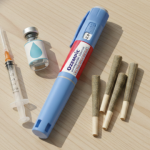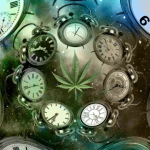Are you at least 21 years of age or hold a valid medical marijuana card?
Daily Specials
{{ special.title }}
{{ special.description }}
*{{ note }}EARTHMED BLOG

Weed Withdrawal Symptoms: Is Marijuana Addictive?

Throughout the history of weed, there has been debate over whether or not cannabis should be described as addictive. However, if you are a regular toker and have tried to quit the cheeba, you know that weed withdrawal symptoms are no joke. And I'm not talking about sobering up from weed after a smoke session. I'm talking about cutting cannabis out of your life long-term.
From sleep disturbances to mood swings, irritability, and stomach issues – marijuana withdrawal symptoms can be genuinely unpleasant for even the casual cannabis user. Since the withdrawal symptoms of weed are relatively well known, this begs the question: Is marijuana addictive?
Marijuana Addiction
Although many states have legalized marijuana for medical and recreational use, the cannabis plant is still federally illegal in the United States. The federal classification of cannabis as a Schedule 1 drug puts heroin, LSD (Acid), MDMA (Ecstacy), and peyote in the same category as marijuana. Addictive or not, cannabis should not be considered a Schedule 1 drug and lumped together with these other substances.
According to the United States Drug Enforcement Agency (DEA), Schedule I drugs, substances, or chemicals are defined as drugs with no currently accepted medical use and a high potential for abuse. This classification would be fine if there weren’t study after study posted by respectable outlets expounding the medical benefits of cannabis for conditions like autism, Parkinson's, and IBS.
It’s important to remember that just because something is medically beneficial doesn’t mean it can’t become addictive. While smoking weed doesn't affect testosterone, for example, it can still have other effects on the human body. Some studies indicated that there may be a correlation between THC and blood pressure.
Typically referred to as marijuana use disorder, marijuana addiction is associated with dependence – when discontinuing the use of marijuana causes withdrawal symptoms. As seen in this study, sustained marijuana use can, over time, lead to dependency. Due to the exogenous cannabinoids entering the endocannabinoid system, the brain adapts by reducing the production of and sensitivity to its native endocannabinoid neurotransmitters.
Once a marijuana user cannot stop using cannabis, even though it interferes with many aspects of their life, marijuana use disorder becomes an addiction. But not in the traditional sense - as it comes to alcohol or opiate addiction. Opiates, alcohol and weed affect the body differently via the pleasure centers.
Simplified tremendously, opiates release a rush of dopamine (feel-good chemicals) in the brain and reinforce to the brain that these good feelings came from using opiates. Marijuana works differently, releasing less dopamine and less reinforcement about where the feelings came from.
The pathway to addiction is complicated but very different between opiates and cannabis. The one thing that all addictions share is symptoms of withdrawal.
Weed Withdrawal Symptoms
As with anything medical-related, marijuana withdrawal symptoms can vary widely from person to person. The severity of weed withdrawal also varies depending on:
- Length of time using marijuana,
- Frequency of marijuana use,
- The potency of cannabis consumed, and
- Body composition.
The longer you have consumed cannabis regularly, especially if you are consuming dispensary-grade weed, the worse you can expect your withdrawal symptoms.
Withdrawal symptoms of weed include, but are not limited to:
- Stomach problems and gastrointestinal distress: Unsurprising since medical marijuana is used frequently to help patients with digestive issues, marijuana withdrawal can cause constipation, diarrhea, nausea, and even vomiting.
- Diminished appetite: One of the most common side effects of cannabis use is increased appetite, so losing your appetite is expected during weed withdrawal.
- Cravings for marijuana: For me, medicating with marijuana comes with its ritual, which can be habit-forming itself. Feeling a strong desire to use marijuana is common during cannabis withdrawal. You probably use weed for a reason, and you will feel that as you detox from marijuana.
- Mood changes: Since cannabis directly impacts mood and happiness, experiencing some irritability and emotional instability is expected as one of the marijuana withdrawal symptoms.
- Sleep difficulties and insomnia: Speaking from personal experience, taking a tolerance break has a tremendous impact on sleep quality, quantity, and clarity. When I stop using marijuana, my dreams become incredibly lucid and real-feeling – if I can sleep at all. Since many people use cannabis to help sleep, discontinuing use can cause insomnia.
- Headaches, brain fog, loss of focus: As your brain adjusts to less exogenous cannabinoids during weed withdrawal, you can expect your head to hurt and feel foggy. Make sure you drink enough water to help your body heal through this time.
- Sweating, cold sweats, chills: Your body needs to adjust to fewer cannabinoids and can have a difficult time with marijuana withdrawal. Experiencing sweats (including cold sweats) or chills is a normal part of the process.
- Feelings of sadness or depression: Marijuana gives most users a feeling of happiness, relaxation, and uplifted elation – taking this away can cause doom and gloom to creep in. Be on the lookout for this, and know yourself well enough to know if you need to talk to your doctor about getting help for your depressive thoughts.
Fortunately, my life is such that I can live blissfully and happily without my marijuana use having a negative impact on my life. Because, with all those weed withdrawal symptoms, my thought is – why would I ever stop?
What do you think? Hit me up on social media, and let's spark up a conversation!
{{ locations[0].name }}
{{ locations[0].address }}{{ locations[0].city }}, {{ locations[0].state }} {{ locations[0].zip }}
{{ locations[0].phone }}
Hours
Sun: {{ locations[0].hours_recreational.Sunday }}Mon: {{ locations[0].hours_recreational.Monday }}
Tue: {{ locations[0].hours_recreational.Tuesday }}
Wed: {{ locations[0].hours_recreational.Wednesday }}
Thu: {{ locations[0].hours_recreational.Thursday }}
Fri: {{ locations[0].hours_recreational.Friday }}
Sat: {{ locations[0].hours_recreational.Saturday }}
{{ locations[1].name }}
{{ locations[1].address }}{{ locations[1].city }}, {{ locations[1].state }} {{ locations[1].zip }}
{{ locations[1].phone }}
Hours
Sun: {{ locations[1].hours_recreational.Sunday }}Mon: {{ locations[1].hours_recreational.Monday }}
Tue: {{ locations[1].hours_recreational.Tuesday }}
Wed: {{ locations[1].hours_recreational.Wednesday }}
Thu: {{ locations[1].hours_recreational.Thursday }}
Fri: {{ locations[1].hours_recreational.Friday }}
Sat: {{ locations[1].hours_recreational.Saturday }}






